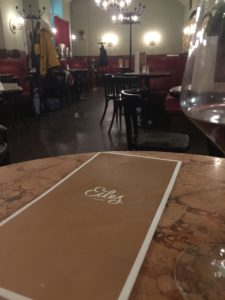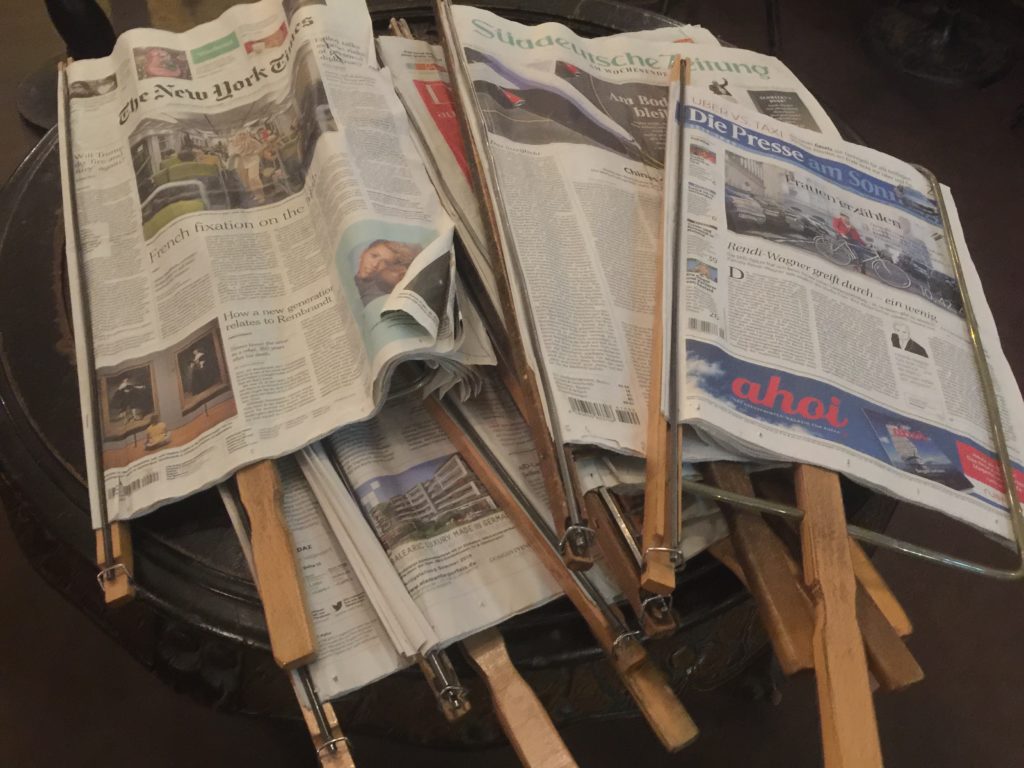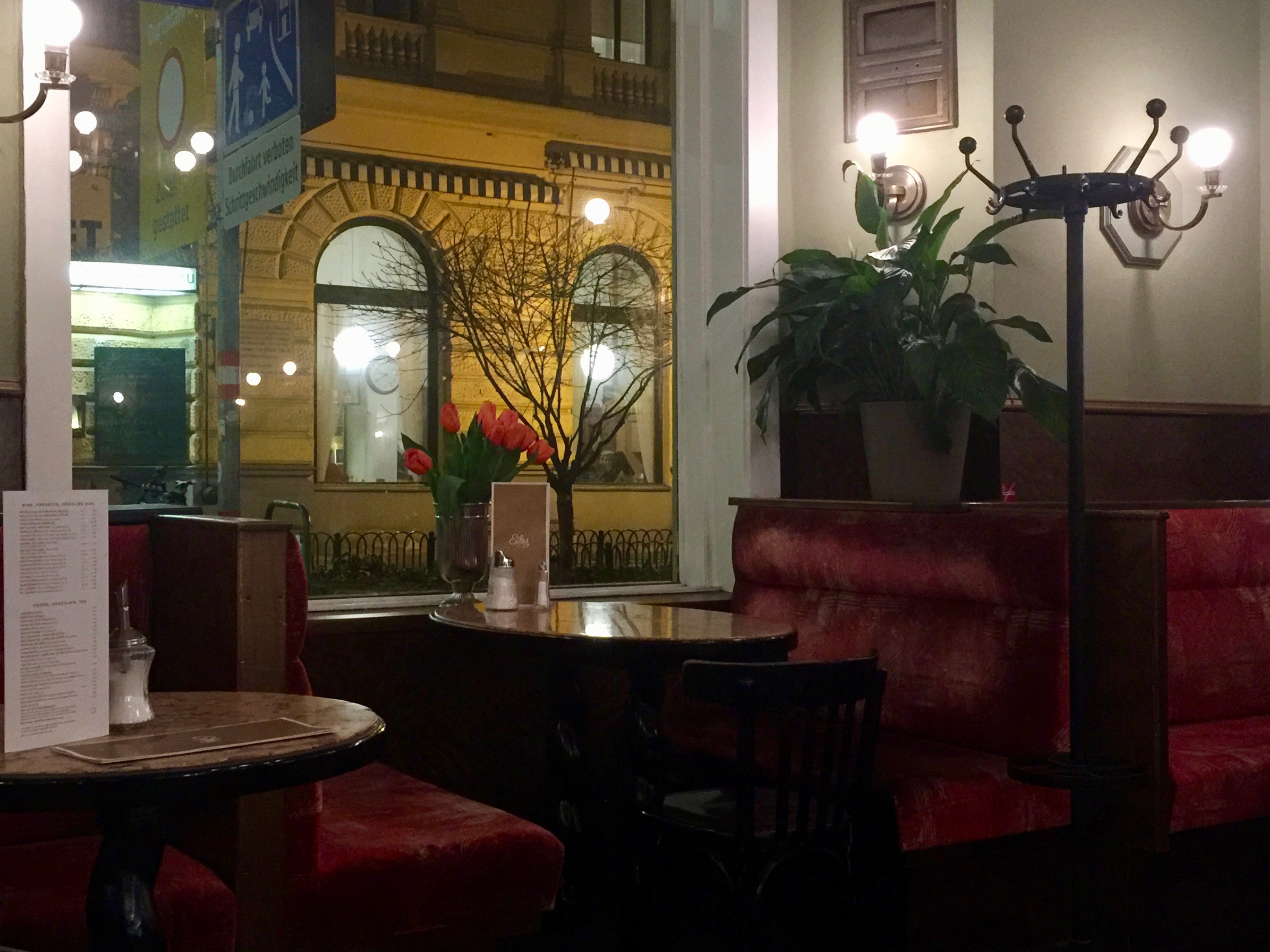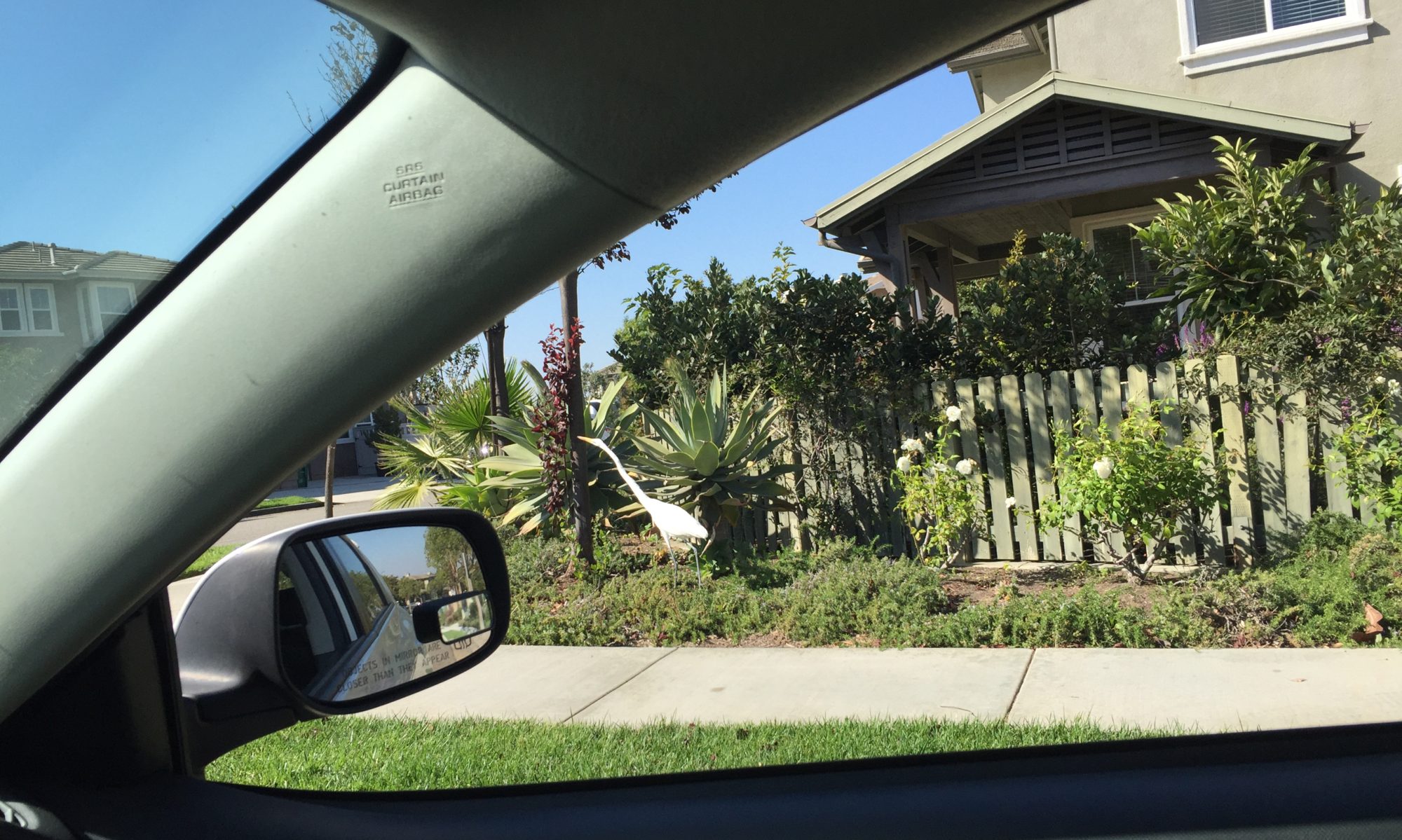I was into my third night of jet lag and needed a late supper. I wasn’t going to sleep anyway. Three minutes away was a traditional Viennese café, Eiles. Its name evokes the German word for “hurry”, which might be thought of as a translation of bistrot. That word sounds French but entered the lingo in 1921 from Russian for “rapidly”, apparently on the lips of refugees which swarmed across Europe after the Revolution.

The implied wiki wiki aspect of bistro cafés is, however, front-loaded. Once served and sated you can wait an unseemly while to attract the waiter’s attention if you need to get up and go, a feature which used to be shared by Parisian cafés, where they have now apparently decided they don’t want you there in the first place, knowing in advance you will want the wrong food, so please pay and leave.
As the banner photo on the Eiles website shows, cafés in Vienna are bastions of upholstered comfort in which we are encouraged to linger. They are also strongholds of convention, everyone expected to conform to an implicit code of polite behaviour and set formulas of language, also to respect the traditional menu. I remember having once asked a waiter at cocktail hour, as I was enjoying a glass or two of wine with a friend, for a little dish of nuts or olives to buffer a bit the inebriation I felt rising within. Mein Herr, came the trenchant reply, “we are in Vienna in a Viennese café. If you want nuts or olives, go somewhere else.” A classic example of the Schmäh or acerbic wit for which the city is notorious.
True to form, Eiles offers standard regional fare, brothy soups in which potatoes or carrots or beets and other root vegetables play a prominent part, chives galore. Probably more salads now than back in the twentieth century, grilled and fried sausages and meats, always a schnitzel or two. And goulash.
That Sunday night I had no fear of the digestive danger a heavy late evening meal might pose to sleep or dream. I wasn’t going to sleep anyway. So I plunked for the goulash and started with a modest Achtel, an eighth liter, of white Grüner Veltliner, actually green by name. I polished it off in a flash because I knew I would be moving on to one or more Viertels, quarter liters, of red Zweigelt.
The goulash appeared quickly, as did the red wine, but I was in no rush. I had picked up a couple of international newspapers to browse through, a service still available in this literate setting, where free papers are bound in wooden slats and displayed on racks at strategic points. I intended to while away as much time as I could before confronting the hole of insomnia which would gape once I returned to my hotel with nothing to do but stare at the backs of my eyelids and toss and turn. Plus, cafés are inherently social spaces into which people come to watch other people, and to be watched.

Austria, like most of Europe, is greying quickly. So I was firmly within the majority of senior and seniorizing citizens out on a Sunday evening for a slice of torte or similar delight and who ended up at Eiles. But we ancient ones were not alone. Viennese apartments are cozy but small and over 60% are owned by the city government which rents them to residents who earn less than 3,317 € a month, roughly $4,000. Monthly rents can easily be less than the 30% of income which financial consultants advise. That means at least some pocket change for entertainment. As in other big cities around the world, much life must pass on the street or take place in public spaces, of which a well-lit café is a perfect example, especially where winters are long and chill. So that Sunday evening there were also many not-so-grey-haired people who had met to chat quietly over coffee or cake. Some were even quite young.
I mention all this because that Sunday night it was pleasing to the old fogey I have become to see young people so respectful of, indeed by all evidence seeking out the shelter of the local code of quiet conversation shared in the presence of others who might be browsing through a newspaper or even reading a book. It was a comforting place in which respect for others was a ground rule.
I tried nonetheless to eavesdrop on the table nearby, the four young Viennese whose demeanor and style had impressed me but also pricked something in my memory. Truth to tell, I was already a bit tight, having had about a half litre of wine by that point. That, and the fact that my German is far from accomplished, enough to get by on, read the newspapers and watch the news, enough sometimes even to make jokes, but usually lame ones. So the gist of their conversation was hard to grasp. I definitively heard passingly repeated something like “vay-gay”, though of course in German, so they weren’t talking about gender and sexuality, at least not primarily. A vay-gay is a WG, a Wohngemeinschaft, what the dictionary calls a commune, though the word has different connotations in English.
Living in a WG is a standard rite of passage for many young Austrians. As best as I could tell this group was lamenting the sudden departure of a prospective WG roommate who had upped and decided to go back to Paris to finish a course he had abandoned. He hadn’t left the others in the lurch, having left rent for two months. But there was considerable speculation about his motives, mostly turning around matters having nothing to do with studies, inevitably affairs of the heart and/or its nether attachments.

I had the odd feeling they were talking about me, though they couldn’t have been. Then it dawned on me. My personal history with Vienna goes back a long way, to Christmas of 1972. That year I was based in Paris but had tired of being there. Through a friend of a friend I was invited to Vienna where the sister of the second friend was willing to put me up for the holidays. I was excited by the prospective change of setting and had seen a photo of the sister in question, Bettina, who had a decidedly erotic appeal to my overheated twenty-six year old imagination. Why not? I had enough money to take the train, a full twenty-four hour trip in those days, and the freedom to move to and stay in Vienna if things worked out.
That was my first encounter with the ethos of a WG. The roomates agreed that I could stay on a spare sofa in the shared living room of Bettina’s for a week if I contributed expenses to the common kitty. The question, I gathered upon my arrival, was left open whether I would move into Bettina’s own private room.
I never did. Instead, ten days later I got back on a train for Paris, intending to collect my things and take what money I had out of the bank and return to Vienna. In those days there are no easy way for an impoverished student to transfer money from Paris to Vienna. Yet maybe I had left the account open in Paris to hold myself hostage, to make sure I’d come back.
I was entranced with the gritty, culturally rich Vienna of 1972. Yet I remember clearly the moment I came out of the métro at Odéon, right in the center of the Left Bank. I looked around at the bustling scene and instantly decided to stay in Paris, where I lived out the year as planned. It was a hard letter to write back to Bettina, with whom I imagined I had unfunished business, as well as the other friends I had made in the WG.
Below is the link to a short story I wrote in my klutzy German a few years back, Schlafsofa, a fictionalized version. There is probably more truth in it and its translation Spare Couch than in this account of what actually happened. In both the real and the fictional versions, I gave up the chance to live in Vienna, a city I have since repeatedly visited but have only friends, no lived roots in, only memories.
That Sunday evening in Eiles thus ended in soppy nostalgia. The ensuing hours of fitful wakefulness were full of bittersweet contemplation of what might have happened almost a half century ago. Could have, would have, should have are often the cryptic topics of jet lag, which is always about being where you aren’t.
